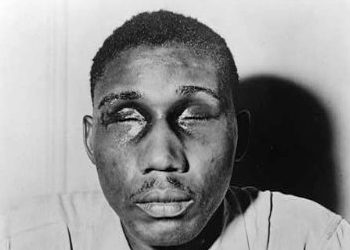A historical marker has been erected to honor the memory of a World War II veteran who was beaten blind by a white police chief and helped spur the integration of the military.
Members of Sgt. Isaac Woodard’s family along with state officials including U.S. Rep. Joe Wilson and Brig. Gen. Milford H. Beagle, Jr. gathered in Batesburg-Leesville, South Carolina on Saturday, Feb. 9 to honor the memory of the soldier who was permanently blinded by his February 12, 1946 attack.

U.S. Army Sgt. Isaac Woodard was beaten by a white police chief in 1946. (J. DeBisse/Library of Congress)
“In order for healing to happen, these things have to be acknowledged. You can’t sweep things under the carpet and not expect there to be a bump,” said the city’s mayor Lancer Shull, according to The Greenville News.
Following a private ceremony, the “Blinding of Isaac Woodard” historical marker was unveiled. A portion of the marker is engraved in braille. It is located at the site of the old police station where white police Chief Lynwood Shull, who bears no relation to Mayor Shull, beat Woodard, according to the Associated Press.
More than 70 ago, 26-year-old Woodward, who was discharged from the Army and heading back home to his family in North Carolina, was forced off a Greyhound bus in South Carolina. He was taken to an alleyway, commanded to show his discharge papers and beaten with nightsticks by Chief Shull and policemen; Woodward was still in uniform during the attack.
Woodward was jailed and accused of being drunk. He was charged with disorderly conduct and it was there in his cell where Chief Shull issued a beating so severe he forever blinded Woodward, who also suffered partial amnesia.
As a result, the NAACP met with President Harry Truman, who launched a federal investigation into the matter. Chief Shull was acquitted by an all-white jury during the trial. However, Woodward’s case inspired the president to integrate the military in 1948.
The soldier recovered at a veterans hospital and was later looked after by his family in New York until he died in 1992 at age 73, the New York Times reported.
“You’ll always be an inspiration to many around the nation,” the AP reported Woodward’s 81-year-old nephew and main caretaker Robert Young tearfully said of the late veteran. “But most of all, you will always be my uncle.”
The criminal charges against Woodward were dismissed in 2018.


